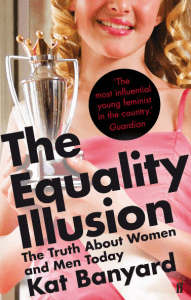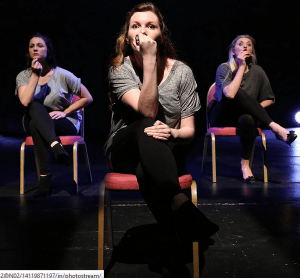As a company our aim is to take existing texts, or speeches, and re-contextualise them in our performances, however doing this means that we have to take into consideration exactly what the text is saying, and what meaning we want the words to take through performance. This means that our work has the potential to be extremely political which I think, as a company, we shied away from, especially for our first performance.
However, as we created our performance we came to notice a theme gradually emerging from the texts that we’d chosen and the way that we had then chosen to perform them. We gradually became aware that our performance concerned itself quite often with subjects that feminists, such as Kat Banyard and Natasha Walker, concern themselves with.
Throughout the creation of Take Me By The Tongue, we seemed to circle back quite often to the connection between a woman’s appearance and the pressure that women may feel from society to perfect their looks. Scenes like the ‘Marilyn Monroe’ scene and the ‘Generation Show’ scene in particular were created specifically to explore the pressures women feel to be physically perfect. In The Equality Illusion Kat Banyard states that “despite decades of feminist critique of the tyranny of beauty, monitoring and manipulating their appearance remains a daily feature of women’s lives. Today it is ‘normal’ for women to worry about their looks when they get up each morning, to religiously check their appearance in the mirror every day, to not want to leave the house without make-up on, or to feel fat or disgusted at the sight of their thighs” (2010.16.17).When you consider that the vast majority of the company, all but our production/stage manager Andy, are female it is unsurprising that we would relate to Kat Banyard’s statement and had unconsciously created scenes of a feminist nature.
The ‘Marilyn Monroe’ scene in particular we created because we could see the juxtaposition between what the words that she, Marilyn Monroe, was saying and how she presented herself, and also we could see this same contrast in our own lives. It was said that when considering her appearance;
“She was uneasy when she first saw herself in the mirror. It wasn’t the ‘real’ me. Then she saw that it worked…The very artificiality of it, she realized, meant that it was a created thing and she would have to create a personality to go along with the new face and the new hair. A bleached blonde is not natural; therefore she cannot wear ordinary clothes or make-up, or be ordinary. She becomes, in a sense, an assembled product” (Zolotow, 1961, 45).
This description of Marilyn Monroe would seem to directly contrast what Marilyn herself says about sexuality and beauty being natural, and that you can’t achieve this beauty by being manufactured. Many of us in the company could understand the desire to feel beautiful naturally and to not feel the need for items such as make –up to make us feel physically acceptable, which linked nicely to the extract from Natasha Walker’s Living Dolls: A New Sexism that is performed in the show as the scene entitled ‘Generation Show’.
When we discovered how many of our extracts linked to feminist writings, and once we embraced the feminist message our show was expressing, we could then clearly see links to feminism throughout the show, even in scenes that were not originally intended to have any feminist connotations. For example, the scene in which Libby has taken the well-known poem Golden Ticket from Roald Dahl’s Charlie and the Chocolate Factory and created a song, a song that is a completely different style and tune to the adaptation that can be found in the 1971 film Willy Wonka and the Chocolate Factory. The purpose of this scene was to use a children’s poem to explore fame, and the sometimes fatal cost of something that is so often strived for. However, when you consider the feminist tone of the rest of the show these scenes that were intended to have a different message also have feminist undertones. Whilst ‘Golden Ticket’ is primarily about fame and drug abuse, when watching the video that accompanies the song you see these famous women and, personally, I can’t help but wonder at the connection between fame and feminine beauty.
As a performer, and a woman, I have always been aware of the Feminist movement, and have enjoyed the chance to explore this movement in more depth through the creation process of Take Me by the Tongue. I think that, as a company, what we have learned through the creation of our debut piece is that we will have to embrace the potential political nature of our upcoming works. The potential for exploring the written and spoken word is limitless in the sense that we are not constricted by an author, or a political movement, and we have to embrace this potential if we wish to continue to create engaging works for many different audiences. In the future we will probably continue to explore themes of feminism, I think as a full female cast these themes would be impossible to avoid, but we will also be able to explore other themes, other political movements. The written and spoken word is powerful and our exploration of these mediums has the potential to create powerful, thought provoking work. What we have learned through the creation of our debut piece is that we shouldn’t be afraid of the political nature our work could take, but to embrace it.
Works Cited:
Banyard, Kat (2010) The Equality Illusion. London: Faber & Faber Ltd.
Zolotow, Maurice (1961) Marilyn Monroe. New York; Bantam


